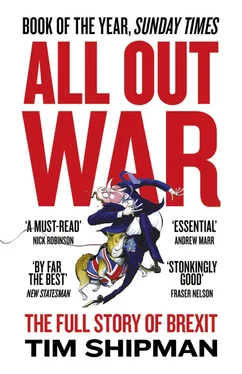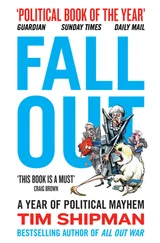Tim Shipman - All Out War - The Full Story of How Brexit Sank Britain’s Political Class
Здесь есть возможность читать онлайн «Tim Shipman - All Out War - The Full Story of How Brexit Sank Britain’s Political Class» — ознакомительный отрывок электронной книги совершенно бесплатно, а после прочтения отрывка купить полную версию. В некоторых случаях можно слушать аудио, скачать через торрент в формате fb2 и присутствует краткое содержание. Жанр: unrecognised, на английском языке. Описание произведения, (предисловие) а так же отзывы посетителей доступны на портале библиотеки ЛибКат.
- Название:All Out War: The Full Story of How Brexit Sank Britain’s Political Class
- Автор:
- Жанр:
- Год:неизвестен
- ISBN:нет данных
- Рейтинг книги:3 / 5. Голосов: 1
-
Избранное:Добавить в избранное
- Отзывы:
-
Ваша оценка:
- 60
- 1
- 2
- 3
- 4
- 5
All Out War: The Full Story of How Brexit Sank Britain’s Political Class: краткое содержание, описание и аннотация
Предлагаем к чтению аннотацию, описание, краткое содержание или предисловие (зависит от того, что написал сам автор книги «All Out War: The Full Story of How Brexit Sank Britain’s Political Class»). Если вы не нашли необходимую информацию о книге — напишите в комментариях, мы постараемся отыскать её.
All Out War: The Full Story of How Brexit Sank Britain’s Political Class — читать онлайн ознакомительный отрывок
Ниже представлен текст книги, разбитый по страницам. Система сохранения места последней прочитанной страницы, позволяет с удобством читать онлайн бесплатно книгу «All Out War: The Full Story of How Brexit Sank Britain’s Political Class», без необходимости каждый раз заново искать на чём Вы остановились. Поставьте закладку, и сможете в любой момент перейти на страницу, на которой закончили чтение.
Интервал:
Закладка:
In Brussels, Rogers told senior Commission officials Martin Selmayr and Jonathan Faull, ‘Guys, if we’re going to solve this, we might have to do something that is risky and cavalier.’ But he was met with firm resistance, and bluntly told the politicos back home that an emergency brake was impossible. As a senior civil servant put it, ‘Ivan was the main bonfire pisser.’
Another political aide said, ‘The PM always wanted an emergency brake, he wanted to announce that in his immigration speech, but he couldn’t because EU law wouldn’t allow it. We’d go round endlessly in circles and come back to emergency brake. He’d go, “We must be able to do something about it!” We’d always come back to “It’s not possible, free movement is a fundamental part of the EU.” It was frustrating for the PM. He knew what he wanted to do, he knew what the British people wanted.’ For their part the officials felt they were being asked to approve ideas with little or no chance of success, and that their job was to advise caution.
Ed Llewellyn had kept lines of communication open with the Germans, who wanted to be helpful but consistently made clear that freedom of movement reform – and treaty change – were not doable. But Cameron believed that he might be successful if he said a brake on numbers was the price of Britain staying in the EU. One of those involved in the deliberations said, ‘A number of people in Number 10 – including the PM – suspected deep down that, when it came to it, in the early hours of a European Council meeting, the EU wouldn’t let the UK leave on the basis of a temporary emergency brake. It would be high-risk, so the trick would be to keep any announced plan high-level – one of the reasons why the Gove leak, with all its detail, was so damaging.’
Two days before the speech, the emergency brake was still in the text and the civil servants mutinied. ‘We asked them how it worked, because you can’t just stop people coming into the country. How do you enforce it?’ an official said. ‘It’s not something we can negotiate, and it doesn’t work in practice. Why the hell are we about to put this in the speech?’
At the last moment, Cameron decided to switch to a proposal that had been drawn up by the Eurosceptic think tank Open Europe to ban EU migrants from claiming in-work benefits such as tax credits and social housing until they had been working in Britain and paying into the system for several years. Ivan Rogers’ team in Brussels and Tom Scholar in London said that would not be tolerated by other EU nations either. Believing the Open Europe proposal would need treaty change, Rogers got his legal adviser, Ivan Smith, to examine the plan. He concluded it was illegal. Rogers told Cameron and his political advisers, ‘Clearly this does require treaty change because this will be deliberate discrimination on the grounds of nationality. I don’t think the other countries can go there. Even if they privately think you’ve got a point, I don’t think they can go there with their publics.’ But Cameron had to offer something on migration. A ban on migrants claiming child benefit for dependants living outside the UK and a pledge to remove those who had not found work after six months were also added. The changes happened so fast that Iain Duncan Smith, who had been sent drafts of the speech for his comments, had no idea the emergency brake had been removed until he turned on the television to watch Cameron speak. As man-management of one of the most influential Eurosceptics went, it left much to be desired. ‘Up until two days before the speech, the emergency brake was there in the speech,’ an aide involved in the deliberations said. ‘The removal was so last-minute that the argument for the brake was still essentially running through the speech he delivered.’
Afterwards, rumours abounded that Merkel and her staff had read the speech and excised the migration cap. But a Downing Street source said, ‘It wasn’t blocked by Merkel, it was blocked by us, because we knew we would never get it. She had not seen the speech.’ The Germans did have some input, however. ‘Ed [Llewellyn] got the message from Merkel’s chief of staff that she couldn’t support it,’ a Number 10 source said.
In fact the decisive intervention that killed off an emergency brake on migrant numbers, a policy which many Cameroons later believed might have been enough for them to win the referendum, was made by Theresa May, the home secretary, and Philip Hammond, the foreign secretary. Both were invited to see Cameron after the regular 8.30 a.m. meeting in Downing Street the day before the speech, along with a small number of officials. A week earlier, May had written Cameron a letter urging him to back an emergency brake. Cameron had made it clear that, despite Merkel’s opposition, he was considering demanding the emergency brake on numbers anyway. ‘The PM told them what the Germans had said, and asked for their view on whether we should go ahead and announce in any case,’ a Downing Street source said. ‘Hammond spoke first, and argued that we just couldn’t announce something that would receive an immediate raspberry in Europe. It wouldn’t be seen as credible domestically, and it would set us on the path towards Brexit. Theresa said very, very little, and simply said that we just couldn’t go against Merkel.’
An eyewitness said, ‘The PM was visibly deflated as they left.’ Cameron turned to one of his officials and said, ‘Look, we tried, but I can’t do it without their support. We’ll just have to go with the benefits plan. If it wasn’t for my lily-livered cabinet colleagues …’
This position might seem reasonable, but given that May and Hammond would later be responsible for negotiating Brexit, it was also instructive of their approach. May was to write a second letter to Cameron on 21 May 2015 urging him to adopt tough immigration measures, but the Cameron aide said, ‘It’s true she obviously wanted as good an immigration deal as she could get. It’s true that she wrote a letter. But when the crunch moment came – do we take a risk, do we go for something that is going to be tougher and that Merkel is not going to back, and that will be tougher to negotiate post the election? – her instinct was that if the Germans don’t support it, we can’t do it.’
A senior Downing Street source says, ‘David Cameron was going for the welfare brake, and he said, “I need an emergency brake. I need to sort this out, because I think that’s what will help.” Who were the two people who told him not to do that because it’s undeliverable? Your new prime minister and chancellor of the exchequer: Theresa May and Philip Hammond. So when Theresa talks about “I will not take no for an answer,” she was the one who folded then. Theresa May and Philip Hammond were the ones to say “You won’t get the emergency brake.”’
The benefits plan was toughened from a two-year ban on claims to three years, and then again to four years in the final draft. When Cameron finally gave the speech on 28 November, he said, ‘Immigration benefits Britain, but it needs to be controlled. It needs to be fair.’ He then used language that was to be adopted wholesale by the Leave campaign: ‘People want government to have control over the numbers of people coming here … they want control over who has the right to receive benefits.’
From that point onwards, David Cameron’s renegotiation hung primarily on the success of a deal on migrant benefits, which was a pale imitation of the one he really wanted. But without the support of Merkel, May or Hammond he did not feel able to proceed. One close aide thinks this was a ‘fundamental misjudgement’: ‘We genuinely thought at the time of that immigration speech we could get some significant movement on immigration. It evolved into controls on benefits because those are more achievable.’ One of the civil servants saw the episode as all too typical of Team Cameron’s general approach to Europe: ‘That was the moment he gave up on controlling numbers, and it was almost by accident.’
Читать дальшеИнтервал:
Закладка:
Похожие книги на «All Out War: The Full Story of How Brexit Sank Britain’s Political Class»
Представляем Вашему вниманию похожие книги на «All Out War: The Full Story of How Brexit Sank Britain’s Political Class» списком для выбора. Мы отобрали схожую по названию и смыслу литературу в надежде предоставить читателям больше вариантов отыскать новые, интересные, ещё непрочитанные произведения.
Обсуждение, отзывы о книге «All Out War: The Full Story of How Brexit Sank Britain’s Political Class» и просто собственные мнения читателей. Оставьте ваши комментарии, напишите, что Вы думаете о произведении, его смысле или главных героях. Укажите что конкретно понравилось, а что нет, и почему Вы так считаете.












